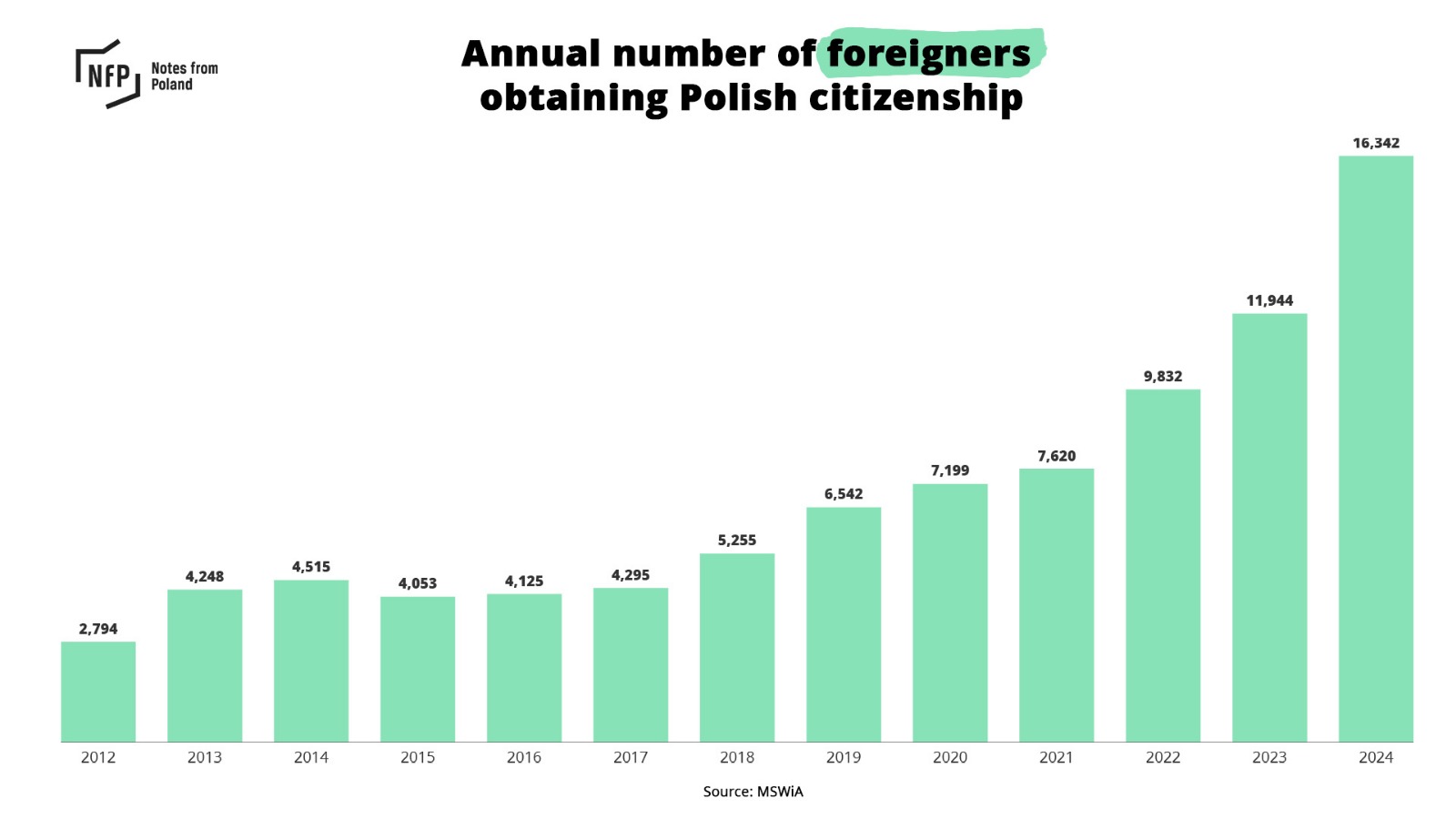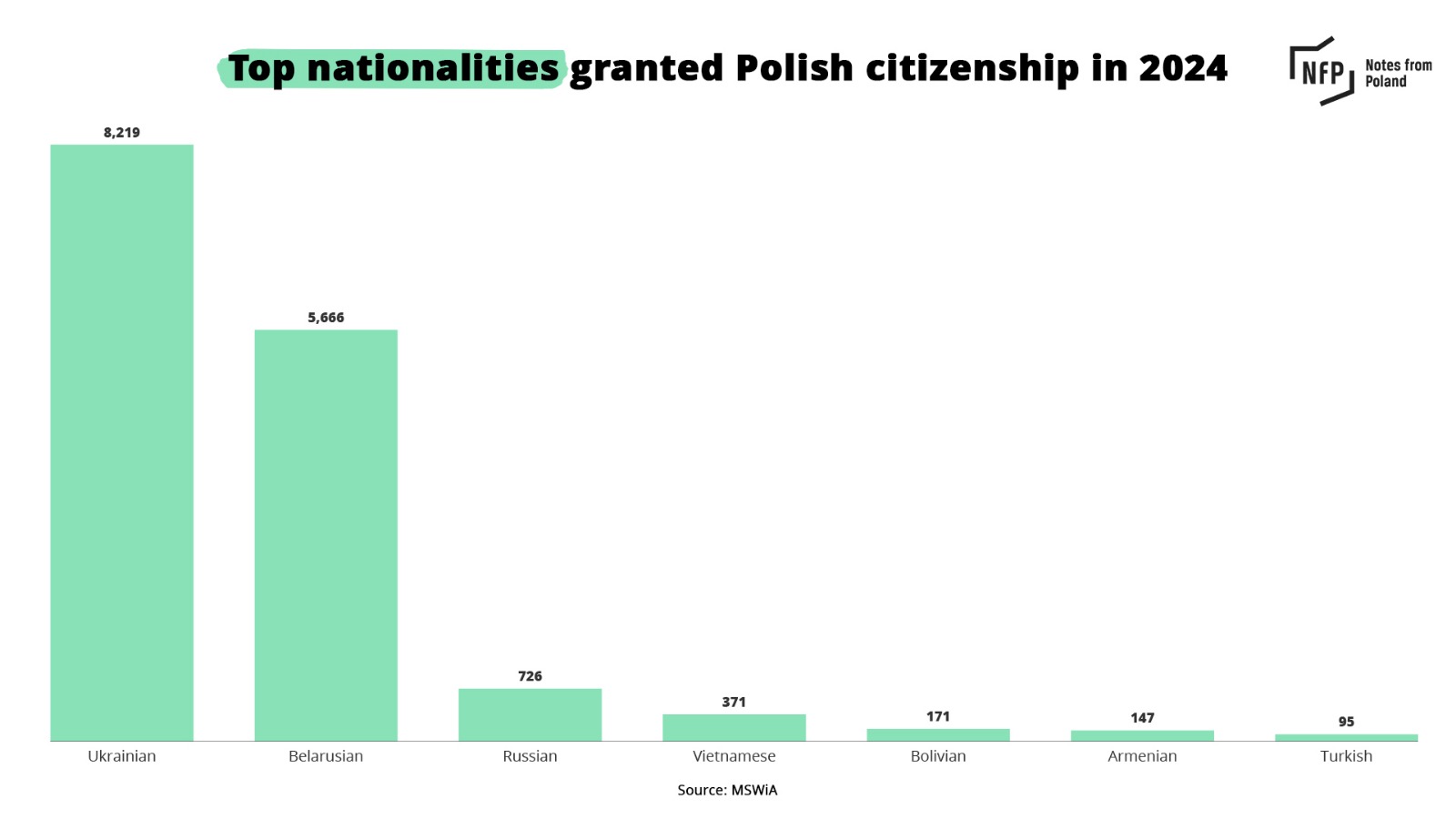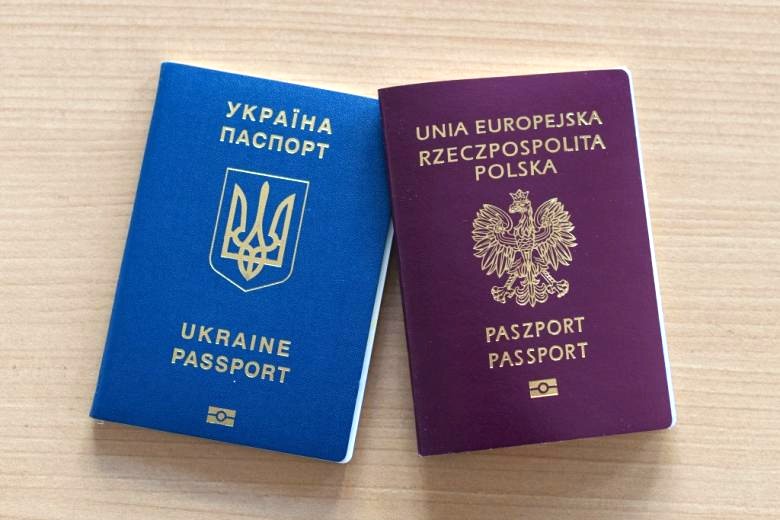Keep our news free from ads and paywalls by making a donation to support our work!

Notes from Poland is run by a small editorial team and is published by an independent, non-profit foundation that is funded through donations from our readers. We cannot do what we do without your support.
A record 16,342 foreigners were granted Polish citizenship in 2024. That was 37% more than in the previous year, marking the fastest pace of growth in over a decade. Ukrainians accounted for just over half of last year’s recipients.
The annual number of foreigners gaining Polish citizenship has risen steadily in recent years, more than quadrupling since 2012. During that time, Poland has experienced record levels of immigration.

The data, which come from Poland’s interior ministry, show that Ukrainians, who are by far Poland’s largest immigrant group, accounted for 8,219 of the 16,342 citizenships awarded in 2024.
The next largest group were Belarusians (5,666), followed by Russians (726), Vietnamese (371), Bolivians (171), Armenians (147) and Turks (95).

Foreigners who do not qualify for citizenship through Polish descent can obtain it in two main ways.
The most common route is to apply to the governor of the province in which they reside. This requires applicants to demonstrate stable income, housing and Polish language skills, as well as to meet the requirement for minimum length of residency.
For most applicants that period is three years of permanent, continuous residence, although that figure is lower in certain cases, for example for spouses of Polish citizens. Poland’s new president, Karol Nawrocki, this week submitted a bill that would, among other things, raise the period to ten years.
The second option is to apply directly to the president for citizenship. This route does not have a requirement for a certain period of residency; decisions are simply at the discretion of the president. But applicants must present their personal histories and reasons for seeking citizenship, alongside proof of ties to the country.
“Foreigners most often try to prove that they have a job and a place to live here, that they cultivate Polish traditions, run a business here, or that their children live here,” Lucyna Gajda of the Małopolska provincial office told news website Bankier.pl. “You can also attach letters of support from respected individuals.”
One recent example of a person taking this route is former Russian speed skating champion Vladimir Semirunniy, who fled to Poland after Russia’s full-scale invasion of Ukraine. This week, he was awarded citizenship by Nawrocki, opening the way for him to compete for Poland at the Winter Olympics.
In 2024, when Nawrocki’s predecessor Andrzej Duda was in office, 1,514 citizenships were granted via the presidential route while 14,828 came from applications to provincial governors.
A Russian speed skater who fled to Poland has now been granted Polish citizenship, opening the way for him to compete for his new country at next year’s Winter Olympics.
Vladimir Semirunniy thanked President @NawrockiKn for helping him obtain citizenship https://t.co/6hfWq69RxA
— Notes from Poland 🇵🇱 (@notesfrompoland) August 27, 2025
Those data above do not pertain to those claiming citizenship through Polish descent. Under the law, such individuals are not being granted citizenship but simply having it confirmed.
Recent years have shown a growing trend for such applications from Israelis, many of whom have roots in Poland, which once had the world’s largest Jewish population.
Applications for confirmation of Polish citizenship by descent by Israelis jumped from around 2,500 in 2021 to more than 9,000 last year. Experts say the surge is partly driven by security concerns, particularly following the Hamas attacks on 7 October 2023.
The number of Israelis applying for Polish citizenship by descent has surged from around 2,500 in 2021 to over 9,000 in 2024.
Applications from other countries have also risen but Israelis are the largest group.
See all the data and our full report here: https://t.co/NkuP8d5ZKm pic.twitter.com/QbjMogT1qh
— Notes from Poland 🇵🇱 (@notesfrompoland) February 12, 2025
Earlier this year, Hollywood star Jesse Eisenberg, whose ancestors were Polish Jews, received his Polish citizenship in a ceremony attended by then President Andrzej Duda.
A Polish passport, as an EU document, also makes it easier to live, work and study across the bloc. Meanwhile, Poland’s booming economy has been among the factors attracting foreigners to Poland.
“Polish citizenship…gives you access to many countries around the world. That is why the number of applications for our citizenship and the number of awards themselves is growing,” said Gajda, adding that it is also attractive because foreigners do not have to give up their original citizenship.
Hollywood star Jesse Eisenberg, whose ancestors were Jews from Poland, has been handed Polish citizenship by President @AndrzejDuda.
The filmmaker – whose latest movie, A Real Pain, was set entirely in Poland – described it as "the honour of a lifetime" https://t.co/krLk8VgUjg
— Notes from Poland 🇵🇱 (@notesfrompoland) March 5, 2025

Notes from Poland is run by a small editorial team and published by an independent, non-profit foundation that is funded through donations from our readers. We cannot do what we do without your support.
Main image credit: Grzegorz Krzyżewski BRPO (under CC BY-NC-ND 3.0 PL)

Alicja Ptak is deputy editor-in-chief of Notes from Poland and a multimedia journalist. She has written for Clean Energy Wire and The Times, and she hosts her own podcast, The Warsaw Wire, on Poland’s economy and energy sector. She previously worked for Reuters.



















